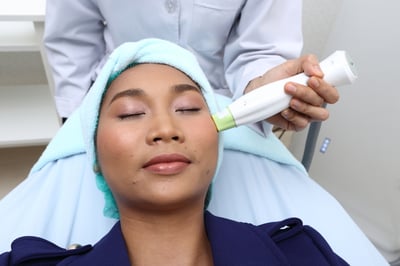
There is good news and bad news. The bad news is there’s no magic ingredient to make acne scars completely disappear. The good news, however, is there are safe and effective treatments available to diminish and reduce the appearance of acne scarring.
What Are Acne Scars?
Let’s back up for a second and explain what acne scars are. According to Dr. Kathleen Garvey, “Not every acne breakout will lead to an acne scar. It takes deeply penetrated acne to damage the surrounding skin tissue. As the acne clears, the body tries to repair this damage by producing extra collagen. If your body produces too much, or too little, collagen you will see a scar.”
There are two types of acne scars. Depressed acne scars happen when the body produces too little collagen which causes depressions or pits as the skin heals. Raised acne scars occur when the body produces too much collagen and form a visible bump. As we age, acne scars become more noticeably because our skin loses collagen.
Who Gets Acne Scars?
Some people are more likely to see scars than others. According to Dr. Garvey, the risk increases when:
• A person has inflammatory acne such as acne cysts. This type of acne tends to penetrate deep into the skin, instead of forming as white pimples.
• A person delays treatment for inflammatory acne. The longer you wait to seek treatment for acne, the greater the risk of scarring.
• A person picks at, squeezes or pops acne. When popping a pimple, you push bacteria deeper into pore. If we didn’t need another reason why not to pop a pimple, know that a scar could be the direct result of your actions.
• A person has a relative who develops acne scars. Your genetic makeup plays a large role in how much acne, and what type of acne you may develop.
What treatments are available?
As we said earlier, there is no magic ingredient to take acne scars away in the blink of an eye. There are treatments available that help diminish the scarring over time.
• Acne scar surgery – best for a few depressed acne scars. To perform acne scar surgery, a dermatologist may lift the scar, bringing it closer to the surface of the skin to make it less noticeable.
• Resurfacing treatments – best for acne scars that are nearly flat. These treatments include laser skin resurfacing, chemical peels and microdermabrasion. Resurfacing removes layers of the skin, which allows the body to produce new skin cells.
• Dermal Fillers – best for a few depressed acne scars. A dermatologist will use fillers to safely and effectively plump depressed acne scars. Many fillers give only temporary results – lasting between 6 and 18 months.
• Collagen-induction Therapy – best for widespread depressed acne scars. Also known as needling or microneedling, this treatment encourages your body to make more collagen to raise the depressed scar. It takes a while to see results from collagen-induction therapy, sometimes as long as 9 months.
• Laser Therapy – best for all types of acne scars. Lasers and other light treatments can treat raised scars safely and effectively. Treatment with a pulsed dye laser (PDL) can help reduce the itch and pain, diminish color, and flatten a raised scar. For people with lighter skin, intense pulsed light (IPL) also may be a treatment option.
Skin Struggles?
If you are struggling acne or other skin issues and don’t know where to turn, the skin health experts at Forefront Dermatology are ready to help. To find the Forefront dermatologist nearest you, visit the locations page today.





